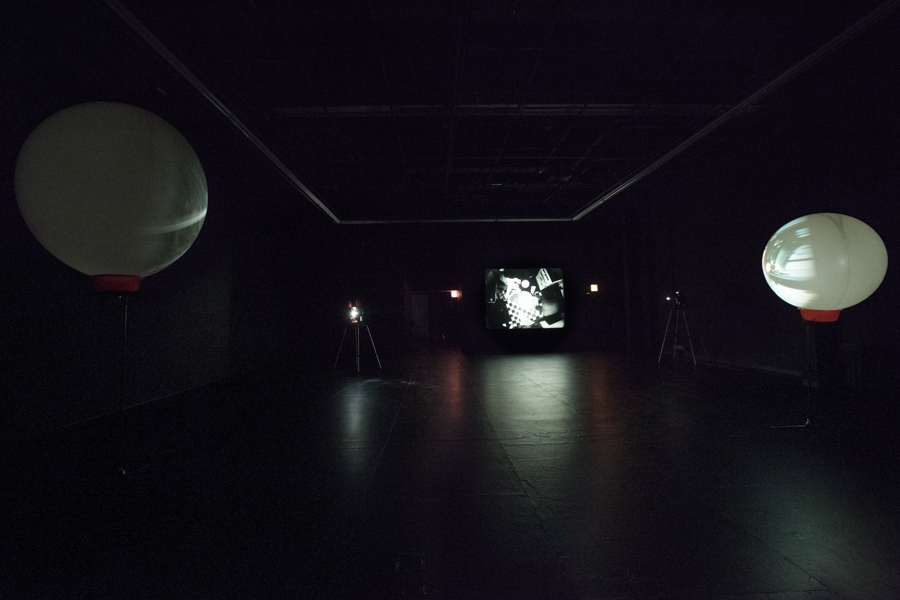The enigmatic work of the Swiss artist and filmmaker Klaus Lutz (1940–2009) can be placed somewhere between the musings of a recluse and the fantasies of a utopian visionary. He moved from Europe, where he’d been engaged primarily as a teacher and printmaker, to New York in 1993, and he transformed the kitchen of his East Village apartment into a studio for DIY stop-motion animations. In Vulcan (2004) he alternately cooks and eats pasta and rolls a runelike disc across diagrammatic structures that appear to float in deep space. In Titan (2008) he flies on paper wings over an anti-… protest to Arabia, where he vanquishes the black-clad avatar of war.
Lutz’s jerky movements, subdued grey tonalities, and amateurish props recall the movies of film pioneer Georges Méliès while lending his own work a deceptive tweeness. That two of the three works screened here are projected onto large balloons, a method the artist himself used, reinforces the madcap and gives one the sense of entering an addled mind. However, his use of images that resemble the Nazca Lines or Man Ray’s Dust Breeding (1920) suggest that sophisticated research lies behind his work. His titles hint at the mystical.
Lutz believed that a universally comprehensible language of signs would soon supplant speech, precluding misunderstanding and engendering a more just society. Before moving to New York he had made etchings based on the Kabbalah and the stories of Robert Walser. Those shown here appear to translate their sources into agglutinative ideograms or show stick figures in networks of curving lines similar to what one sees in the films.
How these diagrams actually relate to their sources remains unclear, just as the language of Lutz’s movies is enigmatic; but it is less as symbol or linguistic theory than as performance that the latter, at least, should be understood. He concluded a typed text introducing the structure of Titan with the hope ‘that you enjoyed this first lesson of my grammar’, suggesting that he aimed to delight, not to educate. His work was an act of humility and generosity. What he eschewed was ego. Often appearing as a miniature figure in his films, and in creating a transparent graphic code, Lutz strove to circumvent individual interpretation, which holds to the self as the arbiter of meaning.
Similarly, Lutz’s withdrawal into fantasies brought to life in his kitchen seems less an act of neurotic isolation – though there is that – than an effort to inhabit a world in which self-abnegation rather than self-assertion ruled. In a text he describes Vulcan as an ‘indefinite series of endless loops’, and his antics – in a 1999 documentary made by Frank Matter and titled The Beauty of My Island – Shooting Klaus Lutz, he wears Tweety Bird boxer shorts – suggest he embraced Sisyphean absurdity as the existential baseline of life and as an antidote to ego.
This article was first published in the January & February 2015 issue.
